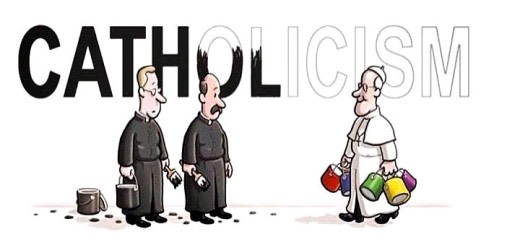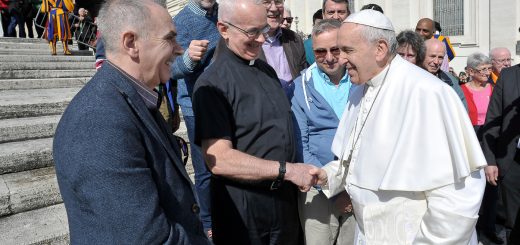La guerra dei tradizionalisti a Papa Francesco
Intervista di Pierluigi Mele al teologo Andrea Grillo pubblicata sul blog Confini di Rai News il 2 agosto 2016
In questi giorni Massimo Franco, notista politico ed esperto di cose vaticane per il Corriere della Sera, in un pezzo dal titolo “I tradizionalisti contro Francesco” riporta, nell’articolo, l’appello, ripreso dal blog ultraconservatore “Corrispondenza romana”, di 45 teologi e storici in cui si chiede al collegio cardinalizio di intervenire sul Papa affinché si ripudino “gli errori presenti nel documento in modo definitivo e finale, e di dichiarare autorevolmente che non è necessario che i credenti credano a quanto affermato dall’Amoris laetitia». E’ l’ultimo di una serie di episodi della guerra dei tradizionalisti contro Francesco. Ne parliamo con Andrea Grillo, docente di Teologia Sacramentaria e Filosofia della religione al Pontificio Ateneo “Sant’Anselmo” di Roma.
Professore, l’impressione che si ha è che il dissenso si stia allargando. È così? Oppure è solo una enfatizzazione mediatica…?
Penso che sia buona norma, anche per i giornalisti famosi, di controllare le fonti su cui basano i loro articoli. Il documento di cui si parla nel pezzo citato è un testo scritto nel linguaggio di 150 anni fa, e firmato da pochi sconosciuti. Gli unici firmatari noti appartengono a settori isolati, marginali e autoreferenziali della Chiesa cattolica. Far passare questa per opposizione a Francesco è una operazione mediatica senza alcun fondamento. Fa sorridere. Al di là dei giornalisti, io direi a coloro che hanno problemi, di esibire qualche argomentazione fondata, qualche ragionamento convincente. Fino ad ora hanno esibito solo propaganda vecchia e presuntuosa disperazione.
Quanta presa hanno sul Popolo di Dio queste posizioni?
Queste posizioni trovano attenzione – e sono anche sollecitate – soltanto da alcuni ambienti curiali – romani o periferici – che nulla hanno a che fare con il popolo di Dio. Sono giochi di potere di chi vede messo in discussione il proprio ruolo clericale, che prima sfuggiva ad ogni controllo e che ora non gode più di libertà. Papa Francesco, come è inevitabile, viene attaccato da chi ha paura della Riforma della Chiesa e di perdere potere. Il popolo di Dio non c’entra nulla e giustamente non si interessa di questo.
Cosa fa paura ai tradizionalisti dell’approccio di Francesco? La lettura complessa della modernità?
Pope Francis explicitly emerges from that anti-modernism that characterized much Catholic culture before and even after the Second Vatican Council. We often confused Catholicism with anti-modernism. To be Catholic was to be "against trains", "against electric light", "against cinema", "against women's suffrage", "against contraceptives"... In a very simple way, but with extreme coherence, Francis rejects a unilateral and hostile reading of modernity. This trait of his is unbearable for traditionalists, but it is also difficult to understand for those who, without being traditionalists, have passively accepted a "convenient" reading of the relationship between the Church and the world. Ultimately it disturbs those who have taken refuge in a comforting "self-referentiality", happy to remain without a way out and to never have to "go out".
One of the criticisms that the conservative front addresses to the Pope is that of being more attentive to "reality" than to "truth". Frankly, I find this an insult to Francesco. Is there any basis for this accusation?
This seems to me to be one of the points that Francis brought to a decisive turning point. The primacy of time over space and of reality over the idea - affirmed with great force in all the great magisterial texts of Francesco, EG, LS and AL - constitutes a "translation of tradition" which
in relation to truth and reality. The accusation made against Francis has the presumption that the relationship with the truth can ignore reality. With this approach - which depends on the anti-modernism of the late nineteenth and early twentieth centuries - the Church has lost its relationship with reality and has closed itself in a dangerous and sterile self-referentiality.
Another "operation" carried out by the traditionalist front is to pit Wojtyla and Ratzinger against Bergoglio. You don't see continuity?
All these resentful positions - which come from radical traditionalists, but also from some Bishops and Cardinals - seek to emphasize the "contradictions" between Francis and his two predecessors. Now we need to understand well here. There is no break. But there is not even simple continuity. The tradition continues, translating itself in a new way. This is also the most authentic meaning of Benedict XVI's words, when in 2005 he spoke of the "hermeneutics of reform" as a remedy for the two wrong hermeneutics of the Council, namely those of pure continuity and pure rupture. Francis does not break, but reforms. But he is aware of the urgency of the reform, while those who oppose him, under the pretext of an alleged rupture, are only afraid of the new, which has always intervened in the Church as a blessing in times of crisis.
Il comportamento del Papa emerito nei confronti del Papa regnante è esemplare. Anzi Ratzinger ha manifestato grande affetto nei confronti di Bergoglio.. Eppure continua questa strumentalizzazione contro Francesco. Perché?
Non vi è dubbio che il rapporto personale tra papa regnante e papa emerito sia buono e cordiale. Il punto però non è questo. Tra il magistero di Benedetto e quello di Francesco ci sono tuttavia alcune differenze significative, soprattutto in rapporto al Concilio Vaticano II. Francesco è pienamente convinto della riforma invocata dal Vaticano II, mentre Benedetto fu esitante, incerto, talora anche spaventato e puramente difensivo. In tre anni Francesco ha ritrovato la fiducia in un magistero che si assume nuove responsabilità, mentre il magistero di Benedetto – e quello dell’ultimo Giovanni Paolo II – era paralizzato dalla tradizione e puramente negativo. Nell’assumere questa grande iniziativa Francesco ha dovuto scontare, non senza difficoltà, le scelte diverse dei suoi predecessori.
Un altro fronte di critica, da parte tradizionalista che trova sponda nell’area politica della destra, è quello del giudizio sull’islam. Insomma, per loro, Bergoglio è troppo buonista. Un’altra infamia nei confronti di Francesco. Qual è il suo pensiero al riguardo ?
Here too we must only consider serious things. There are not many authoritative opinions on this matter and a lot of chatter. The position towards Islam finds its origins in a conciliar approach to "other religions" which has found a profound revival with Francis. No concession to propagandistic generalizations and consideration of the complexity of individual traditions. In his return interview from WYD, Francis recalled that the phenomenon of "fundamentalism" does not identify any religious tradition. “Even among us,” he recalled, we have many. It should be added that on the topic of the relationship with Islam we must first of all be clear about the quality and depth of our tradition. Stating, as a well-known journalist did, that Muslims cannot participate in mass "because they do not believe in the real presence" seems to me to be the demonstration of a rather worrying theological and ecclesial approximation. And on the basis of this evident ignorance they also think they have to give advice to the Pope...
There are also criticisms against the pastoral care of "mercy". We find ourselves faced with two opposing visions of the Church. How do they coexist?
As Stella Morra wrote, in a beautiful book entitled "God does not get tired", the theme of "mercy/forgiveness" is central in Francis' magisterium not as a "content", but as a way of understanding the Church and the relationship with God. It is the "style of mercy" that removes the Church from its self-referentiality, that forces it to "go out into the streets", not to "stay at the window", to build "field hospitals" and refugees". This language gets on the nerves of all the monsignors with long cars, cufflinks on their wrists, maids in service, houses full of rooms... It is a model of the Church and of the Gospel that is being put back on the field and in play, after decades of
addiction to the exercise of formal power and purely authoritarian recognition.
On a liturgical level, here too the traditionalists seem to suffer from Francis. Is that so?
On the one hand it does not seem that Francis is as interested in the liturgy as Benedict was... but on the other hand the changes introduced in the "washing of the feet" and the recent request to "avoid using the expression 'reform of the reform'" clearly indicate a orientation towards the full valorization of "active participation" as a "popular" logic of Christian liturgy and prayer. Here too, those who would like their right to "stay behind" to be protected feel, so to speak, uncomfortable. When women's feet and liturgical reform return to the center, many curial concerns and fixations on rubrics suddenly find themselves on the far periphery!
Last question: What appears, in reality, to be the final objective of the conservatives is to put the creativity of the Second Vatican Council into default. Is this the real stakes?
It is actually very useful not to "personalize" the issue too much. With Francis we have found, 50 years after the Council, the first pope "son of the Council" - that is, one who was "born to ministerial life in the Church not pre-, but post-conciliar - who proposes the Council not first of all theoretically, but with his way of thinking about reality, of communicating, of establishing relationships, of praying or joking. All this is "council made alive and effective".
Those who thought that with John Paul II and then with Benedict XVI we had "protected" the conciliar impetus are now surprised, embittered, in some cases angry. But Francesco proceeds calmly. As he has said several times, he sleeps well at night. It would be a good thing if even his most vocal interlocutors would put their hearts at rest and be able to sleep in the evening.






